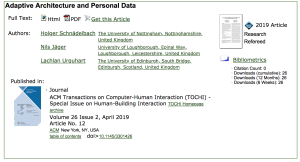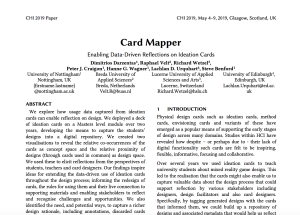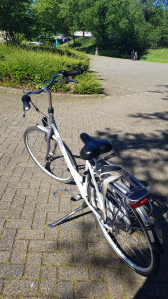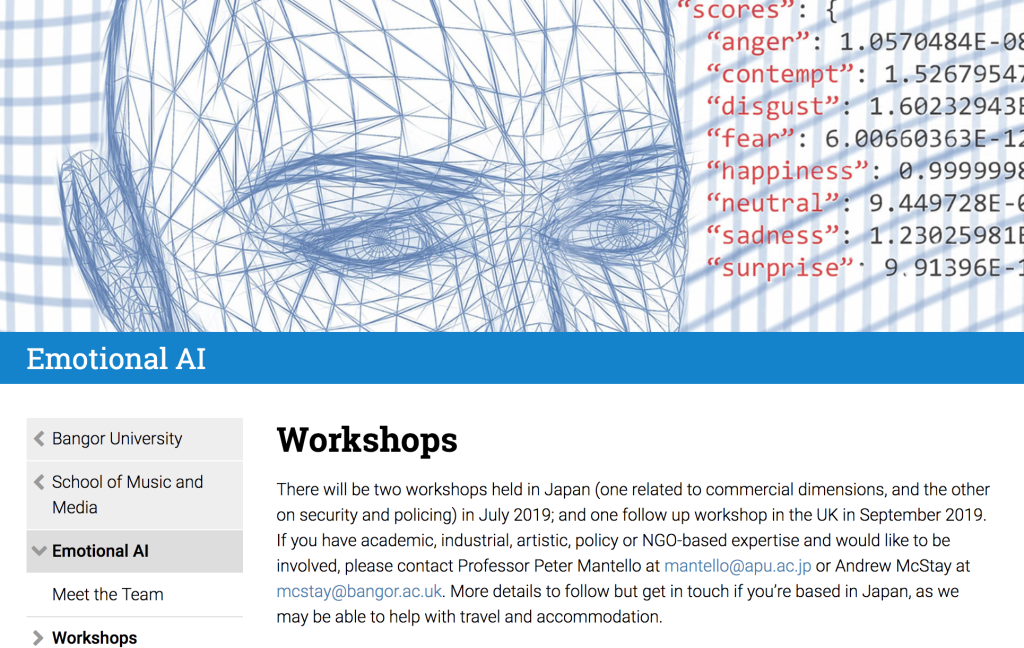

post by Lachlan Urquhart (2012 cohort)
I’ve been meaning to write up a blog for a while now on recent research activities this Spring (buying and moving house in the middle may have slowed this somewhat…) But there have been some interesting events, conferences and papers I’ve had the pleasure of being involved with so here we go with a whistlestop tour…
In early April, I was invited to speak at an interesting workshop at the Alan Turing Institute on Uses and Misuses of Connected Devices, where I presented about recent research I’ve been doing on designing and regulating smart buildings (the event website has a range of PPTs from other speakers available, so check it out).
 This links into a recent ACM Transactions on CHI paper that appeared in a special edition on Human Building Interaction (HBI). Written by Holger Schnädelbach, Nils Jäger and myself, the paper (Adaptive Architecture and Personal Data) reports on a series of workshops exploring the interactional dimensions of adaptive architecture and personal data. This paper takes a different more HCI orientated focus, in contrast to our other paper focused on adaptive architecture and regulation (which also just came out recently in the BILETA special edition of the International Journal of Law Computers and Technology). The TOCHI edition has other fascinating papers on interactive windows as ubiquitous displays, how architects think about interaction, temporal dimensions of HBI, designing for distraction in hospitals, understanding workshops in fabrication.
This links into a recent ACM Transactions on CHI paper that appeared in a special edition on Human Building Interaction (HBI). Written by Holger Schnädelbach, Nils Jäger and myself, the paper (Adaptive Architecture and Personal Data) reports on a series of workshops exploring the interactional dimensions of adaptive architecture and personal data. This paper takes a different more HCI orientated focus, in contrast to our other paper focused on adaptive architecture and regulation (which also just came out recently in the BILETA special edition of the International Journal of Law Computers and Technology). The TOCHI edition has other fascinating papers on interactive windows as ubiquitous displays, how architects think about interaction, temporal dimensions of HBI, designing for distraction in hospitals, understanding workshops in fabrication.
 In other HCI news, our paper ‘Cardmapper: Enabling Data Driven Reflection on Cards‘ was presented at the major ACM HCI conference CHI 2019 in Glasgow in mid April. This exciting paper led by Dimitrios Darzentas involves researchers from the Mixed Reality Lab & Horizon, Lucerne University, Breda University and myself here at Edinburgh. My colleague Peter Craigon, who works with me on the Moral-IT cards, presented the paper to the world’s HCI community at the massive event at Glasgow’s SECC. The work showcases an augmented reality app [video here] developed to capture use of ideation cards to build up a repository of how they have been used in practice. The goal is then to feed this back to designers, to understand how cards are being utilised over time, and to spot trends (e.g. if designers get fixated on particular ideas). The app was tested using Richard Wetzel’s fantastic Mixed Reality game design cards. We are developing this work further, so watch this space.
In other HCI news, our paper ‘Cardmapper: Enabling Data Driven Reflection on Cards‘ was presented at the major ACM HCI conference CHI 2019 in Glasgow in mid April. This exciting paper led by Dimitrios Darzentas involves researchers from the Mixed Reality Lab & Horizon, Lucerne University, Breda University and myself here at Edinburgh. My colleague Peter Craigon, who works with me on the Moral-IT cards, presented the paper to the world’s HCI community at the massive event at Glasgow’s SECC. The work showcases an augmented reality app [video here] developed to capture use of ideation cards to build up a repository of how they have been used in practice. The goal is then to feed this back to designers, to understand how cards are being utilised over time, and to spot trends (e.g. if designers get fixated on particular ideas). The app was tested using Richard Wetzel’s fantastic Mixed Reality game design cards. We are developing this work further, so watch this space.
 In further card news, Peter and myself recently attended TILTing Perspectives 2019 at Tilburg University. This conference examines law, society and technology, and is one of the largest biannual IT conferences in Europe. I was presenting our work on the Moral-IT cards, discussing their development as a tool to support research and development teams to consider wider normative values in the design of new technologies. It was also nice to be in a session with fellow Edinburgh academics James Stewart and Charles Raab, who I’m working with on a project on WiFi tracking, as they talked about their work (with others) on the Edinburgh IoT Ethics and Governance Initiative.
In further card news, Peter and myself recently attended TILTing Perspectives 2019 at Tilburg University. This conference examines law, society and technology, and is one of the largest biannual IT conferences in Europe. I was presenting our work on the Moral-IT cards, discussing their development as a tool to support research and development teams to consider wider normative values in the design of new technologies. It was also nice to be in a session with fellow Edinburgh academics James Stewart and Charles Raab, who I’m working with on a project on WiFi tracking, as they talked about their work (with others) on the Edinburgh IoT Ethics and Governance Initiative.
 This talk was an opportunity to share some of our findings from numerous workshops we’ve run over the past year with different research projects. The cards, when used with the impact assessment process (all materials available here) support reflection by teams on how to design more ethically informed systems and applications from the start, as opposed to waiting until something ‘bad’ happens. We are in the process of writing up these findings in a series of papers (including one for CHI 2020), but it was encouraging to see the cards so well received. We managed to hand out a few of the newly printed decks too – get in touch if you fancy some… all we ask in return is your soul… I mean some information about if you like them (which @futureidentity kindly stated he did recently on Twitter).
This talk was an opportunity to share some of our findings from numerous workshops we’ve run over the past year with different research projects. The cards, when used with the impact assessment process (all materials available here) support reflection by teams on how to design more ethically informed systems and applications from the start, as opposed to waiting until something ‘bad’ happens. We are in the process of writing up these findings in a series of papers (including one for CHI 2020), but it was encouraging to see the cards so well received. We managed to hand out a few of the newly printed decks too – get in touch if you fancy some… all we ask in return is your soul… I mean some information about if you like them (which @futureidentity kindly stated he did recently on Twitter).
Also… if you get bored of thinking about ethics (how could you!)… they can double up for a game of Blackjack  .
.

In another joint conference paper at BILETA 2019, a month before TILTing, Jiahong did a fantastic job presenting our first paper from the EPSRC DADA project, with the Gikii esque title “Defence Against Dark Artefacts: Casting out the Evil in Smart Homes” (see CREATe write up here). Together with Derek McAuley and Lilian Edwards, this WiP (full journal paper coming soon  ) provides preliminary thoughts on the DP household exemption, personal information management systems (such as our favourite example, Databox), the DADA system and how data protection concepts translate to smart homes. In a fascinating panel event on ‘Data Subjects as Data Controllers‘ at TILTing 2019, Lilian presented a great paper drawing on and extending this work, with particular reference to Databox and recent case law.
) provides preliminary thoughts on the DP household exemption, personal information management systems (such as our favourite example, Databox), the DADA system and how data protection concepts translate to smart homes. In a fascinating panel event on ‘Data Subjects as Data Controllers‘ at TILTing 2019, Lilian presented a great paper drawing on and extending this work, with particular reference to Databox and recent case law.
I’ve also had the pleasure of attending some fascinating SICSA events of late, such as the Pre-CHI day at Dundee University (which was very useful as I could not quite justify the c $1000 entrance fee for the full conference… so this gave a whistlestop tour of what else is going on in the Scottish HCI community). Just last week, I also attended another SICSA event at Heriot Watt University on Serious Games for Cybersecurity. As I’m in the process of designing such a game in the context of the DADA project, this was really useful to see how others have been developing such tools (for example in bringing security concerns into Agile software development processes using a tabletop game, or creating a web based game to train software developers on fundamental concepts). In general, this was a really interesting day.
 In other DADA related work, research by Stanislaw Piasecki, Derek McAuley and myself, based on a short project on cybersecurity standards and IoT threats in smart homes will be presented at EUROCRIM 2019 in Ghent Belgium. This will be a great chance to present our emerging work in this area to leading criminologists to further inform our understanding of the challenges cybersec standards face in practice (and if they are really fit for purpose…).
In other DADA related work, research by Stanislaw Piasecki, Derek McAuley and myself, based on a short project on cybersecurity standards and IoT threats in smart homes will be presented at EUROCRIM 2019 in Ghent Belgium. This will be a great chance to present our emerging work in this area to leading criminologists to further inform our understanding of the challenges cybersec standards face in practice (and if they are really fit for purpose…).
Lastly, our research trip to Japan as part of the ESRC Emotional AI project with Andy McStay, Vian Bakir and Peter Mantello is fast approaching. This project, funded for £50k by the ESRC, is a collaboration between Bangor, Ritsumeikan Asia Pacific University and Edinburgh. We will run a series of multi-stakeholder workshops with different organisations (industry, academics, policymakers, NGOs, creatives) to explore the deployment of emotion sensing technologies in commercial and security contexts in Japan and in the UK. If you’re interested in the work, particularly the UK one hosted at the Digital Catapult in September, let us know.

Originally posted at https://lachlansresearch.com/2019/06/03/research-update-spring-2019/
https://lachlansresearch.com/2019/06/03/research-update-spring-2019/